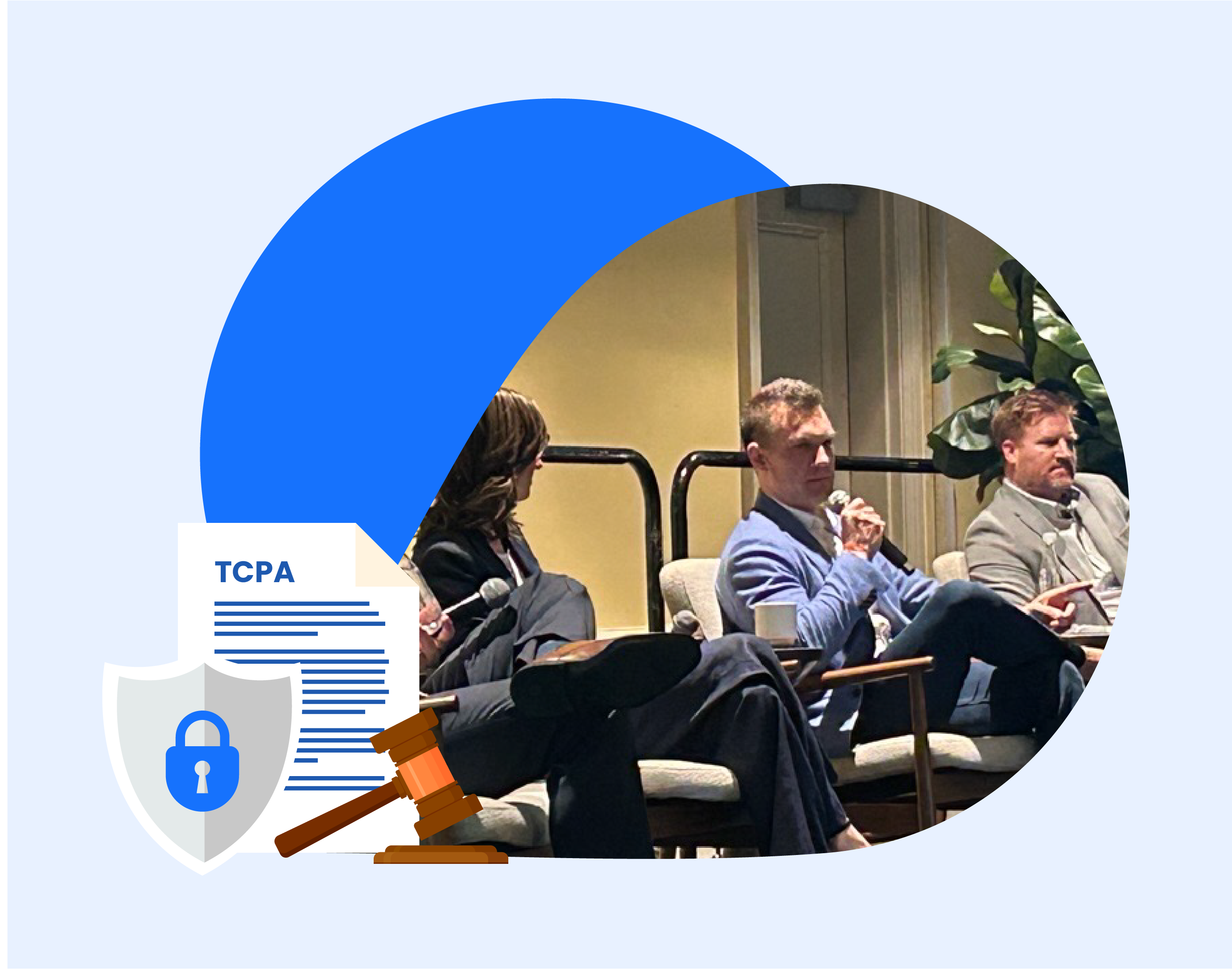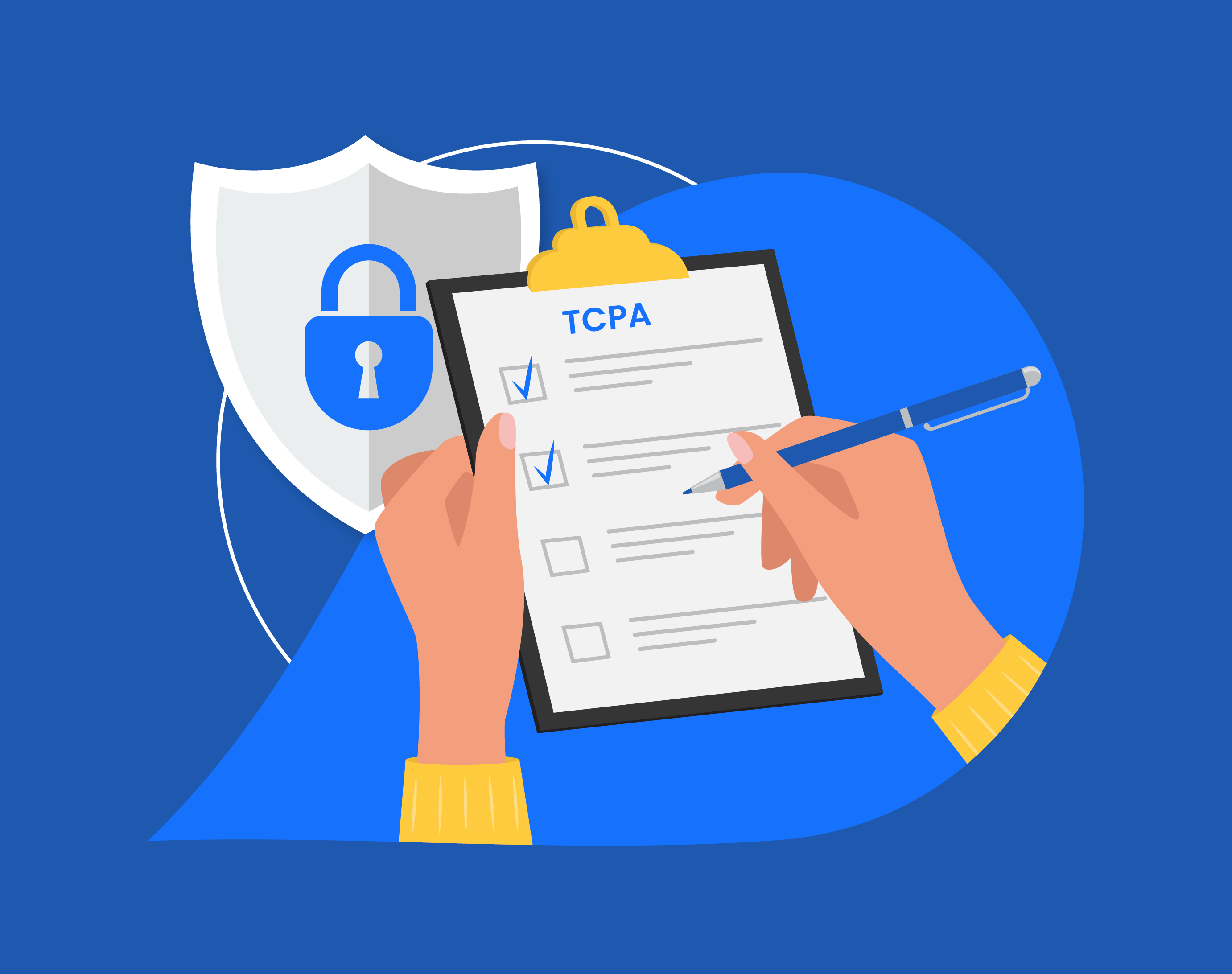FCC TCPA Regulations Overview: 2024 / 2025 Consent Compliance Changes
Updated October 22, 2024
The FCC is making major changes in 2024 and 2025 that impact how consumers can revoke TCPA consent. If your business is dialing or sending text messages to consumers, these changes will impact TCPA compliance for your outreach.
What Are the FCC TCPA Consent Revocation Changes?
A Federal Communications Commission (FCC) Report and Order from February 2024 announced major changes affecting opt-outs from TCPA prior express consent. One of these TCPA regulations took effect in April 2024, while the other two consent changes will take effect April 11, 2025.
Here are the TCPA rule updates affecting businesses that call and text:
- Businesses must allow consumers to revoke consent in "any reasonable manner." Effective date: April 11, 2025
- Callers must honor do-not-call (DNC) and consent revocation requests within 10 business days. Effective date: April 11, 2025
- Businesses may send a one-time SMS to confirm or clarify opt-outs. Already effective as of April 4, 2024
What Do the TCPA Updates Mean for Your Outreach?
These FCC rules mean that businesses will need to look closely at their consent practices and make sure that they have a robust and consumer-centric approach. If you’re ready to take steps to upgrade your TCPA compliance for 2025, download our overview infographic covering the new TCPA regulations and read on for more details.
Want even more detailed insights from our team? Grab your copy of the TCPA Consent Rules eBook right here!
Recognizing Consent Opt-Outs Made in Any Reasonable Manner
With FCC compliance updates starting April 11, 2025, consumers can revoke consent in any reasonable manner. Relying on keyword prompts like "Reply STOP to end" is risky. Instead, make sure your outreach technology can recognize real-world opt-outs. An AI solution like Disqualified by Drips can help manage this at large scales.
The regulations clarify that text senders must accept certain keywords as a reasonable way for people to revoke their consent. These words are:
- Stop
- Quit
- End
- Revoke
- Opt out
- Cancel
- Unsubscribe

However, while these keywords must be accepted, the FCC was clear that these are not the only opt-out methods businesses need to worry about.
If a consumer attempts to opt out by saying, “no more texts!” or, ”I’m not Mary,” it is a best practice to accept those messages as opt-outs.
Read more about reasonable TCPA opt-outs and how enterprises can solve this challenge.
Honoring Requests Within 10 Business Days
No matter how a consumer opts out — SMS, phone, email, or other channels — enterprises must honor the TCPA consent revocation request within 10 business days. That means the consumer’s consent status and contact preferences must be processed quickly across all relevant systems.
To accomplish this, companies may need to audit data and software systems connected to outreach campaigns. If one component of the system doesn’t get fresh data quickly enough, there is a chance that a consumer could be sent a non-compliant message or call after they’ve already opted out.
For large enterprises with complex systems, it may be helpful to consider a consent and preference data management platform. For example, Drips partners with PossibleNOW to help our clients seamlessly manage TCPA opt-out data.
One Chance to Clarify Opt-Outs
An FCC rule that took effect in April 2024 clarified that organizations may send one message to confirm that the consumer has revoked consent. If the consumer opted into multiple categories of text message, you could use this message to seek clarification on the scope of the opt-out. In other words, you can ask if the consumer wants to stop all contact or just some campaigns.
You need to hurry, though. The FCC stated that this confirmation text must be sent within just five minutes of the opt-out request. In addition, the confirmation cannot contain any marketing messages.
It remains to be seen how effective these texts will be in retaining partial engagement after an opt-out. Another option is to proactively stop outreach at the right time to avoid the consumer revoking their consent in the first place. This could be handled manually at smaller scales, or with technology like Conversational Close-Outs for large audiences.
Learn more about this FCC rule with our deep dive on TCPA confirmations.
What Are the Risks?
TCPA violations can result in penalties of $500-$1,500 per violation. For organizations contacting thousands of consumers daily, a lapse in compliance could add up to major costs.
There is no cap on total penalty for TCPA violations. The largest TCPA damages ever awarded totaled $925 million!
And that’s only considering the financial damages from legal action. A breach of consumer trust from TCPA non-compliance could cost even more in brand reputation loss.
Key Takeaways About TCPA Consent Revocation Changes
To sum up the key points from the FCC’s 2024 and 2025 TCPA regulation changes:
- Unpredictable opt-out language from consumers opens the door for potential TCPA violations.
- Confirmation texts give enterprises a chance to turn global opt-outs into partial ones.
- When it comes to contact preference and opt-out data, seamless integration is a must for TCPA compliance.
Your Partner in Outbound Compliance Management
Fast-changing regulations continue to be a major challenge for enterprises looking to reach their audiences. That’s why Drips helps clients Keep It Safe by staying on top of regulatory changes. Drips offers proprietary compliance technology like Disqualified by Drips that can help enterprises solve TCPA compliance challenges at scale. Best of all, we take a managed service approach, so your organization is never alone when it comes to safe, effective outreach.
If you’re ready to get ahead of the game with TCPA compliance, get in touch with Drips today.
Disclaimer: This document and all information contained in it are for educational and informational purposes only. Neither Drips nor any of the writers of this document are law firms or attorneys, and nothing herein should be construed as or relied on as legal advice. Drips and the authors herein disclaim any obligations relating to the timeliness or accuracy of the information contained here. No warranties should be implied. Although intended to be current and accurate, regulations and court rulings, as well as interpretations of the same, are always changing and we recommend consulting with your own counsel.







